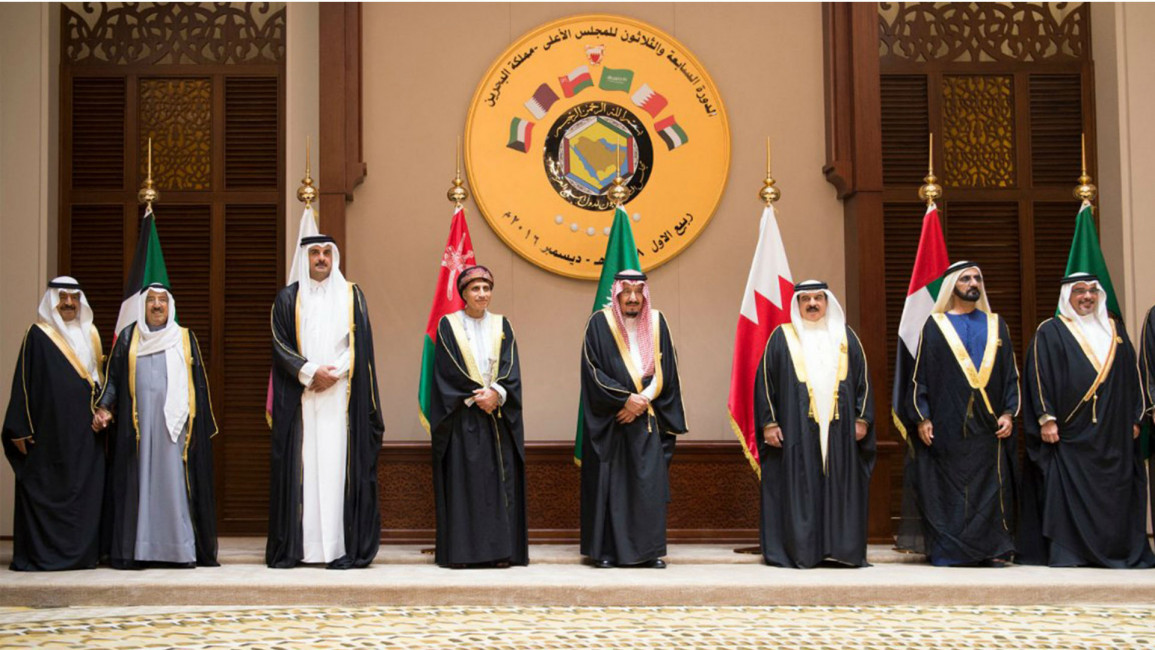Bahrain arrests journalists and bars media from GCC summit
Bahrain arrests journalists and bars media from GCC summit
Arabic-language broadcaster al-Araby TV has been barred from broadcasting at this week's GCC summit in Bahrain, with its service provider's staff arrested.
2 min read
Gulf leaders are meeting in Manama for the 37th GCC summit [Anadolu]
Journalists from al-Araby TV and al-Jazeera have been barred from reporting at this year's Gulf Cooperation Council (GCC) summit in Bahrain, with media staff arrested following an interview in Manama.
Bahraini authorities stopped a live broadcast of al-Araby TV's interview with former Bahraini MP Abdulaziz Abel for its Arab Today programme and arrested journalists involved in its production.
The censorship of the London-based broadcaster comes as UK Prime Minister Theresa May attends the summit looking to strengthen economic ties with Gulf States as Britain prepares to leave the EU.
An al-Jazeera journalist was also refused entry to Bahrain. The Qatar-based network has faced restrictions operating in the island nation since reporting on Arab Spring protests in Manama in 2011. Its journalists were also barred from attending the GCC's 33rd summit in 2012.
"The immigration officer... informed me the ministry of information said al-Jazeera was not allowed to cover the event and I was rejected entry," al-Jazeera's reporter told the network on Tuesday night.
Bahrain has a dubious record with press freedoms. Media campaign groups have strongly criticised the island state for its suppression of free speech and jailing of journalists.
In February, four US journalists were briefly detained while covering the anniversary of the 2011 uprising.
Mamama said they were arrested for entering the country illegally, joining protests and lying to border staff, according to al-Jazeera.
Bahrain requires all journalists reporting for outside media to obtain a license from the information authority with permission for reporters critical of the country's regime usually denied.
Journalists in Bahrain have also been handed long jail sentences on dubious accusations such as "participating in demonstrations", "property destruction" and "supporting terrorism", according to press freedoms advocacy group Reporters Without Borders.
In 2015, Saudi Prince al-Waleed bin Talal saw his Bahrain-based al-Arab TV channel closed down hours after its first live broadcast following an interview with a Bahrain dissident.
Bahraini authorities stopped a live broadcast of al-Araby TV's interview with former Bahraini MP Abdulaziz Abel for its Arab Today programme and arrested journalists involved in its production.
The censorship of the London-based broadcaster comes as UK Prime Minister Theresa May attends the summit looking to strengthen economic ties with Gulf States as Britain prepares to leave the EU.
| Read more here: British PM eyes post-Brexit trade deals at Gulf summit |
"The immigration officer... informed me the ministry of information said al-Jazeera was not allowed to cover the event and I was rejected entry," al-Jazeera's reporter told the network on Tuesday night.
Bahrain has a dubious record with press freedoms. Media campaign groups have strongly criticised the island state for its suppression of free speech and jailing of journalists.
In February, four US journalists were briefly detained while covering the anniversary of the 2011 uprising.
Mamama said they were arrested for entering the country illegally, joining protests and lying to border staff, according to al-Jazeera.
| Read more here: UK Prime Minister: Britain will 'push back' against Iran |
Journalists in Bahrain have also been handed long jail sentences on dubious accusations such as "participating in demonstrations", "property destruction" and "supporting terrorism", according to press freedoms advocacy group Reporters Without Borders.
In 2015, Saudi Prince al-Waleed bin Talal saw his Bahrain-based al-Arab TV channel closed down hours after its first live broadcast following an interview with a Bahrain dissident.


![Hundreds demonstrate against the White House Correspondents' Dinner in support of Gazan journalists. [Brooke Anderson/TNA]](/sites/default/files/styles/image_330x185/public/2024-04/5cde0bce-4652-4e28-a001-f06b9b8f8e28.jpg?h=ddb1ad0c&itok=R_uaRAn7)
